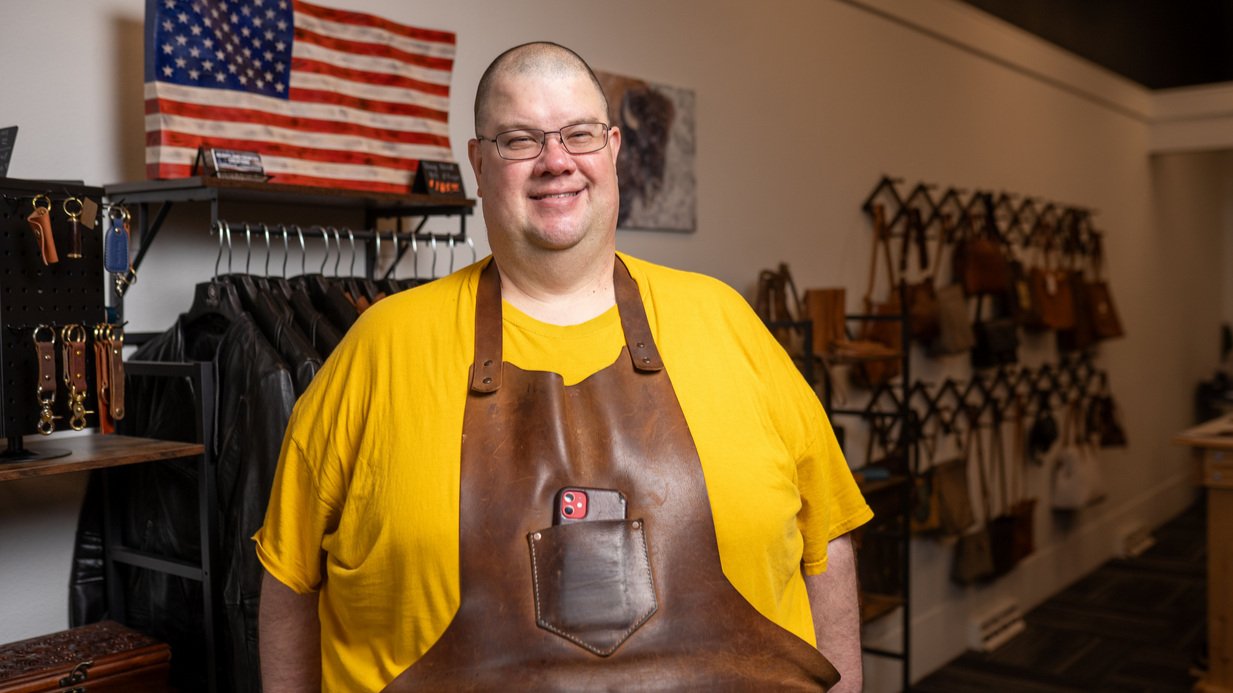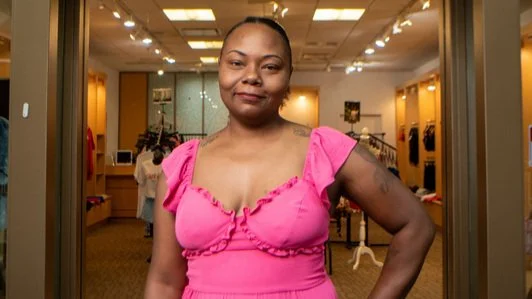Mingus Leather | Shop Local
By LAUREN JURGENSEN | Photos by BRIAN PETERS
MEET THE LEATHER ARTISAN
Doug Mingus was reflecting on his career path during the pandemic when, after 21 years in the ministry, he found himself thinking about pursuing leathercrafting more seriously.
“There were a lot of changes happening, and I had to decide to make a different choice,” said Doug, the owner and founder of Mingus Leather Studio & Gifts, located in downtown Topeka. “It really started because I needed something to take my mind off of work and find a little more enjoyment.”
Encouraged by friends and seeking relief from the stresses of work, he revisited a memory from childhood: the beauty of leather.
“I remembered my little league glove from way back when, wondering what it takes for leather,” Doug said. “That started the journey.”
He reached out to other artisans and used resources he found online to develop and hone his leathercraft skills.
Soon, he was selling his handmade wares at farmer’s markets. Doug’s friend Kevin Conard, the owner of Topeka’s Blue Jazz Coffee, urged him to think about opening his own leathercraft store.
“He said, it’s not going to be easy,” Doug said, “but you sound like you love it, so maybe it’s possible.”
A few days after that conversation, Kevin called Doug to tell him that he’d found the perfect spot for his future business. Mingus Leather settled into its storefront at 929 South Kansas Ave. one month later.
BEHIND THE SEAMS
Nearly two years after its grand opening, the store has become a hub for local artisans. Doug’s studio specializes in small leather goods, which he creates either by himself or in partnership with fellow artisans from the community.
“I have lots of leather products, and then I have products by other artisans,” Doug said. “I have products by woodworkers, pen makers, candle makers and jewelry makers, which are sold on a consignment basis. The store gives them a place to share their beauty and art.”
He values crafting quality products by using only full and top grain leather, which he believes to be far superior to the materials often marketed as “genuine leather.”
“There’s a lot of misleading advertising out there,” Doug said. “Just sticking the word genuine in front makes people think, ‘Oh, this is the best leather.’”
He is particularly passionate about the quality and longevity of leather items, many of which can last a lifetime and be passed down as family heirlooms. He hopes that his high-quality leather products will inspire more people to turn away from the disposability mindset that’s been baked into consumer culture.
“You can take care of leather and you can hand it down for generations,” Doug said. “I worked on a bag here that was on its fourth generation in the family. I want to get people to realize that this is better for our families, better for our economy and better for the environment, too.”
His passion for creating long-lasting products can be seen in the range of leather repair and restoration work he offers. He was surprised to discover how much of his business has become dedicated to repairing leather goods, as many customers bring in items that hold sentimental value.
Most of his buyers are women over the age of 35, but his customer base spans all ages and demographics.
“That’s what leather can do,” Doug said. “It can cross generations and people can love it at any stage of life.”
He noted that it can be hard for people to find gifts for men, which is why Mingus Leather’s inventory has many leather products with masculine appeal.
“If there’s a way to bring beauty to more people, then maybe that will fall into other areas of their life,” Doug said.
CRAFTING COMMUNITY
One of the best things about the leatherworking world, he said, is how communal it is. He’s found that leather artisans are more collaborative than competitive. They’re willing to share knowledge and uplift one another, rather than viewing each other as rivals.
“They’ll teach you, they’ll share secrets. It’s a pretty amazing community of people,” he said. “That’s the only reason I’m here. I never had the funds to go and get trained at a school or study under someone for years.”
Collaboration and championing the success of others, Doug said, can lead to mutual success.
Although most of his sales occur in-store, he has also established a small online presence, primarily serving previous customers who return for new purchases. For now, he prefers to focus on his storefront and isn’t looking to open more locations at this time
.“That’s not really who I am,” Doug said. “If it happens, that would be great. But I like the personal touch of things.”
His short-term goals for Mingus Leather are already within reach: create a sanctuary where artisans can put their work on display, and where customers can “breathe deep, smell some beautiful leather and enjoy what they see,” he said.
Doug’s time in the ministry has shown him how to slow down and not only create better leather products, but also forge deeper connections with customers from all walks of life.
“In the world of ministry, you get the chance to talk to a lot of different people in a lot of different situations,” he said. “I think that gives me a leg up when people walk in the door, to be able to read people a little bit, see how they’re doing and be open to having conversations they may not have anywhere else.”
Doug added that building connections with others is about slowing down, breathing and paying attention to what’s around you.
“You cannot work in leather if you don’t slow down and pay attention to the details,” he said. “If you get in a hurry, you’re going to either ruin the leather or hurt your own hands. That’s an advantage that ministry has taught me.”
He believes that buying local can help people pursue their dreams, similar to how the customers at Mingus Leather have helped him pursue his own.
“Buying local helps the community,” Doug said. “I really believe that if we support one another’s dreams, all of us would be more happy. What would our community be like if this was our goal?”
Doug also believes that locally made products are higher quality than what you’ll find in a corporate store, where items are less likely to be manufactured with longevity in mind.
“We have enough garbage in landfills, we don’t need more,” he said. “People that make local or regional products tend to care more about the product than the sale of the product. I think you feel more connected to your city when you’re buying from people who are trying to make the city better and make their dreams come true. That connection is beautiful, and I think you can get that from buying local in a way that you can’t get otherwise.”











